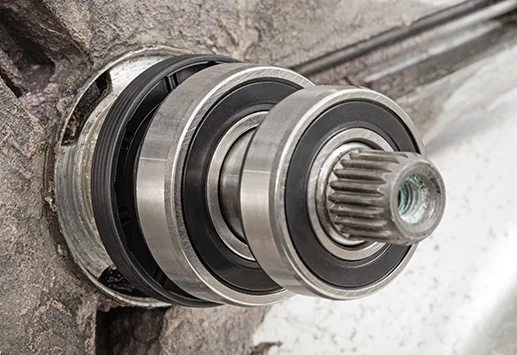How Do Seals Prevent Contamination and Extend Bearing Life

When it comes to maximising the lifespan of industrial bearings, navigating the options can seem overwhelming, especially in demanding environments. But often, the key to extending a bearing’s service life isn’t complicated: the right bearing sealing solutions can make all the difference.
Seals play a crucial role in lubricant protection and contamination prevention, ensuring that bearings perform reliably and efficiently, even under tough conditions. By selecting the right seal for your application, you can optimise your bearing’s performance and longevity.
Let’s explore the two main types of bearing seals (contact and non-contact), and the environments where they work best.
Non-Contact Seals
Non-contact seals are designed to keep contaminants out and lubrication in without touching the shaft. These seals are ideal for applications where shaft misalignment is a concern or where centrifugal forces assist in keeping contaminants at bay.
Oil Seals (Rotary Shaft Seals)
Oil seals are a versatile option for preventing leakage of lubricants and ingress of dirt or moisture. Their robust design makes them a reliable choice for a wide range of industrial applications.
Labyrinth Seals
Labyrinth seals use a maze-like structure to create multiple barriers against contaminants. These seals thrive in high-speed applications commonly found in aerospace, power generation and food & beverage, where centrifugal force enhances their effectiveness.
Flinger Seals
Flinger seals rely on a rotating disc to deflect debris and liquids away from the bearing. Simple yet effective, they’re perfect for environments with splash hazards or heavy particulate contamination like those found in construction, marine and mining.
Contact Seals
Contact seals provide a physical barrier between the bearing and external contaminants. Made from durable materials like synthetic rubber or felt, they’re excellent for preventing even the smallest particles from reaching the bearing.
Radial Shaft Seals
These are among the most common contact seals, offering a tight fit that keeps dirt, dust, and liquids out while maintaining lubrication integrity. The design of radial shaft seals often includes a flexible lip that tightly hugs the rotating shaft, supported by a metal casing or spring to maintain consistent pressure.
Felt Seals
Lightweight and cost-effective, felt seals are best suited for low-speed applications where moderate protection against contaminants is sufficient. You’ll typically find them in textile manufacturing, woodworking, and HVAC systems.
Taconite Seals
For extreme conditions, taconite seals are the go-to choice. Their rugged construction can handle high-pressure washdowns and severe contamination, making them ideal for heavy-duty industries like mining and steel mills.
Why the Right Seal Matters
The correct sealing solution is vital for maximising the longevity of industrial bearings. Whether you’re battling high-speed operations, harsh contaminants, or shaft misalignment, selecting the right seal ensures optimal lubricant protection and prevents costly downtime caused by contamination.
Seals might be a small component, but their impact on bearing performance is anything but minor. Choosing the right one is a simple yet highly effective way to protect your investment and keep your operations running smoothly.
Looking for advice on the best sealing solutions for your bearings? Talk to our Bearing experts today.
